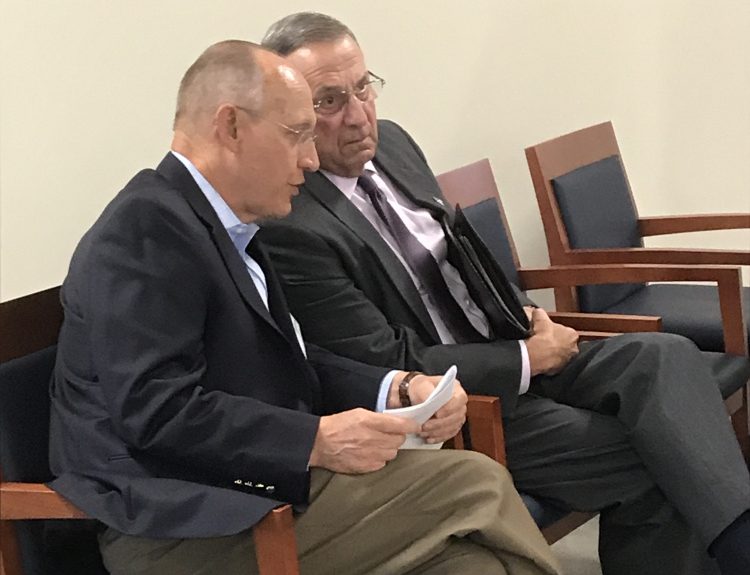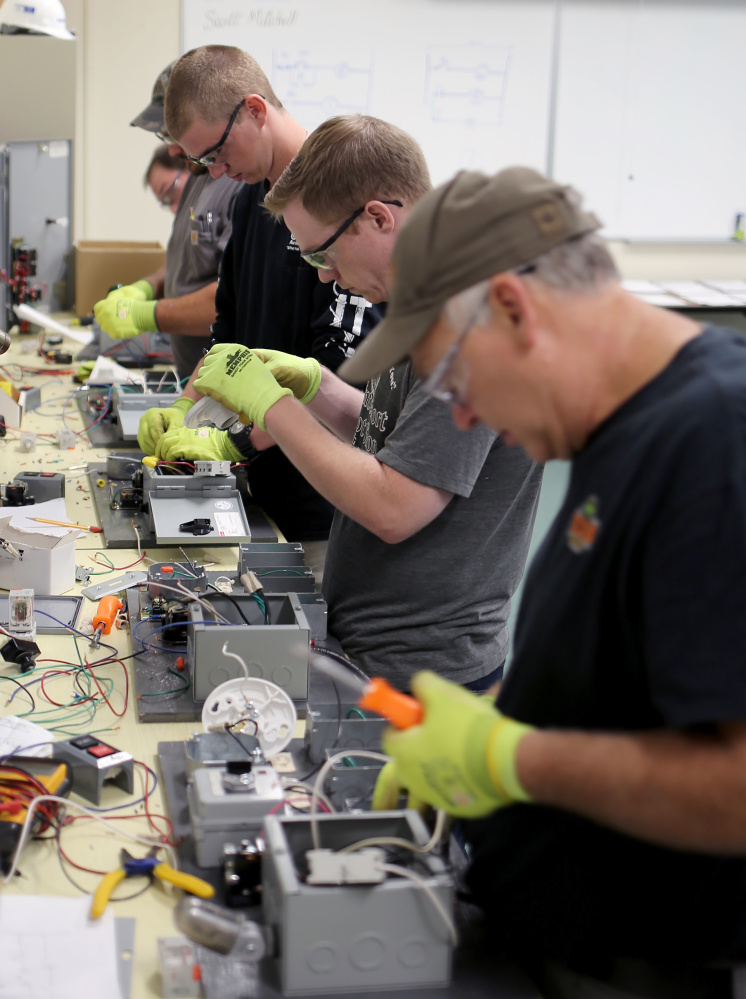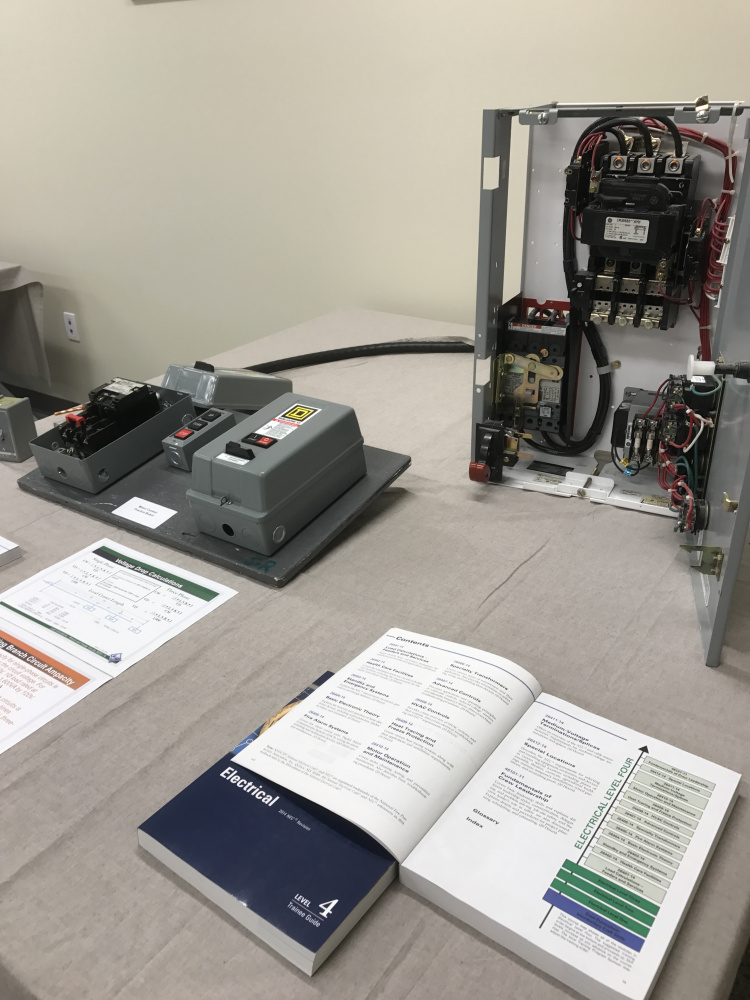PITTSFIELD — Gov. Paul LePage said Thursday that he values vocational training more than traditional education, saying classroom teachers are “a dime a dozen.”
The governor made the remarks at the unveiling of Cianbro’s new workforce development center that aims to help replenish a diminishing workforce in the construction business with education and training.
LePage praised the work Cianbro was doing with its new institute offering opportunities in vocational training that once were more widely offered, like shop class and home economics, which he said “were really good for our society back then.”
“Instead of hiding vocational education, we have to do what we used to do and bring it back to the front of the classroom,” LePage said. He also took jabs at traditional education, saying Cianbro’s new facility was noteworthy because it was placing more value on mentoring, which is “more than just teaching out of a book.”
“Because teachers are a dime a dozen, mentors are what we really need in our system to prepare the next generation to take over,” LePage said. “It’s mentoring that’s more valuable. And I’m certain this institution is going to be mentoring.”
Lois Kilby-Chesley, president of the Maine Education Association, the state’s largest teachers union, said in an interview afterward she was surprised to hear about the governor’s comments because Maine is struggling to fill many teaching positions compared to other New England states.
She said the MEA did not agree with the “dime a dozen” comment because of unfilled positions and didn’t believe any superintendent in the state would either.
Kilby-Chesley also said the MEA has supported vocational education in schools, now known as career and technical education. She said it prepares people for jobs that are more hands on, but said students can’t be lumped into one category where they are told which path to take. She said students need to make choices, whether to pursue career and technical education or a path that leads toward higher education.
“Students will make choices based on their interests,” she said. “Not every student fits the same hole. Different pegs require different holes.”
Cianbro’s new workforce development department, called the Cianbro Institute, provides in-house training from construction to electrical work to its employees.
Peter Vigue, chief executive officer of Cianbro, said the company was providing this training already in separate locations in Pittsfield, but “we’re busting out at the seams.” In introducing LePage, Vigue said Cianbro was passionate about people and the industry, which he said were values shared by the governor.
LePage recounted that when he was first elected, he sent a cartoon to all the school superintendents in the state, depicting a plumber talking to a teacher. The teacher said they made $30,000 a year while the plumber said they made $65,000.
“And the superintendents were livid. You should see some of the comments I received,” LePage said. “But I was right.”
The actual cartoon was different, featuring a student who was going to be a welder and another student going for a liberal arts degree and different salary figures for both. The cartoon, which was actually sent to high school principals across the state, also included a handwritten note, saying: “Folks. We can do better and need to do better! Let’s put our students first.”
LePage said education is a transition and he said it takes six years to get a bachelor’s degree in Maine. He gave the example of his daughter, who he said had begun school to become a physician, but had just graduated law school, saying she changed her mind. He said while that was good, it had become increasingly harder to find an electrician or plumber.
“I’m telling you the trades and vocational education are critical,” he said, adding that “you still have to have a roof over your head.”
He said career and technical education opportunities were important, since “not everyone is going to go to college.”
Aside from placing value on vocational education, LePage commended Cianbro for being an innovative and forward thinking company. He said it was one of the first companies leading the way in workplace safety. In the 1990s, it was hard for companies to find insurance providers for workers compensation, he said, but Cianbro was already doing that.
“They were very, very interested in keeping their workers healthy and on the job,” he said.
Vigue, who said the governor’s praise would be heard by all 4,000 of the company’s employees across 40 states, said the kind of training the institute provides is very valuable to young people from “humble backgrounds” or who have limited economic opportunities or low self-esteem.
“We are creating and building people who have integrity, character and skill,” he said.
The institute provides mentoring to current employees. Scott Mitchell, an instructor for the institute, said Cianbro has a four-year apprenticeship program, where those enrolled have at least 576 hours of learning time both in the field training and in a classroom environment. In those hours, he said, the apprentices learn the electrical trade through hands-on, practical training.
Cianbro, which has been nationally recognized as the Healthiest and Safest Company in America by the American College of Occupation and Environmental Medicine, was started in 1949 and has grown ever since. Vigue said that even though the company’s headquarters are in a small town, to be recognized like that was significant.
While the workforce challenge in the state and country could be perceived as a problem, he said it presents an opportunity to “invest in the future of the workforce,” which would create endless opportunities for individual employees and the company. “It’s all about people,” he said. “If we keep it simple, we can be successful over time.”
In terms of workplace challenges, Don Whyte, president and CEO of NCCER, formerly known as the National Center for Construction Education and Research, said the workforce needed for building can’t be reached without investment, which he praised Cianbro for understanding. He said there are estimates that nearly 2 million construction workers will be needed by 2020, which is challenging in an environment where fewer people are coming into the industry as more and more people are leaving it. By 2020, he said, 65 percent of all jobs will require more than a high school degree but less than a bachelor’s degree, which is why career and technical education is so important. He said that level of education will help replenish the pipeline of workers in the future.
“Cianbro created a fabulous facility that will help us move the ball,” Whyte said.
Michael Bellaman, president and CEO of Associated Builders and Contractors, said the Cianbro facility was “awesome” and that he is continually impressed by Cianbro’s work. Companies like Cianbro, which is a member of ABC, give the organization a credible voice “as we work for legislation,” he said.
President Donald Trump has signed an executive order seeking to streamline the permitting process for infrastructure projects, Bellaman said. The economy from the construction perspective is not softening, and actions like Cianbro opening this facility are what’s needed.
“We want to give opportunities for people with unique strengths,” Bellaman said. “We’re excited about this apprenticeship expansion.”
Colin Ellis — 861-9253
cellis@centralmaine.com
Twitter: @colinoellis
Send questions/comments to the editors.






Success. Please wait for the page to reload. If the page does not reload within 5 seconds, please refresh the page.
Enter your email and password to access comments.
Hi, to comment on stories you must . This profile is in addition to your subscription and website login.
Already have a commenting profile? .
Invalid username/password.
Please check your email to confirm and complete your registration.
Only subscribers are eligible to post comments. Please subscribe or login first for digital access. Here’s why.
Use the form below to reset your password. When you've submitted your account email, we will send an email with a reset code.